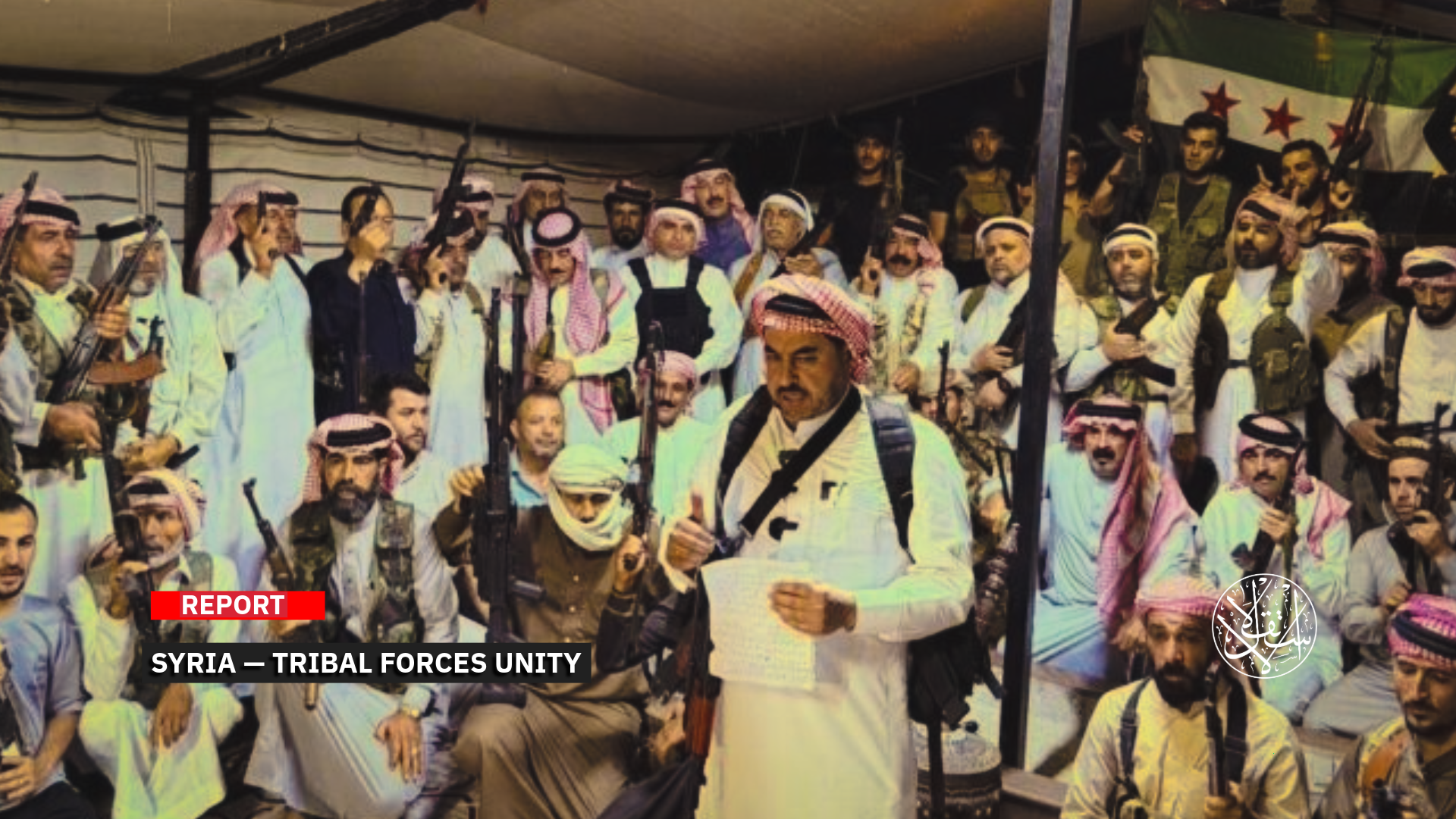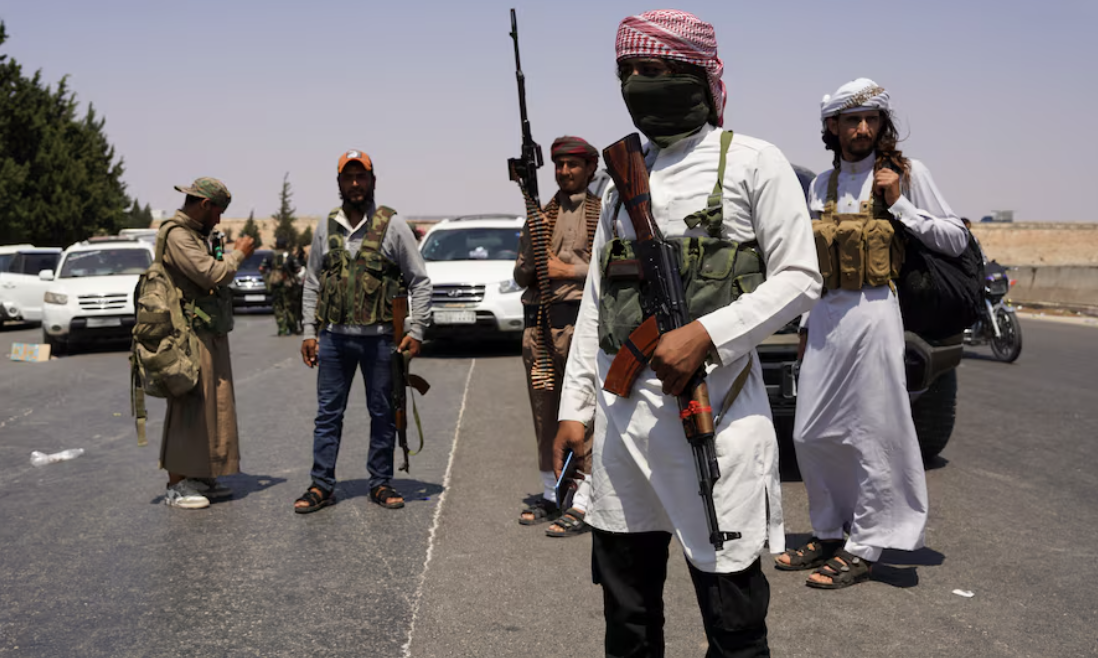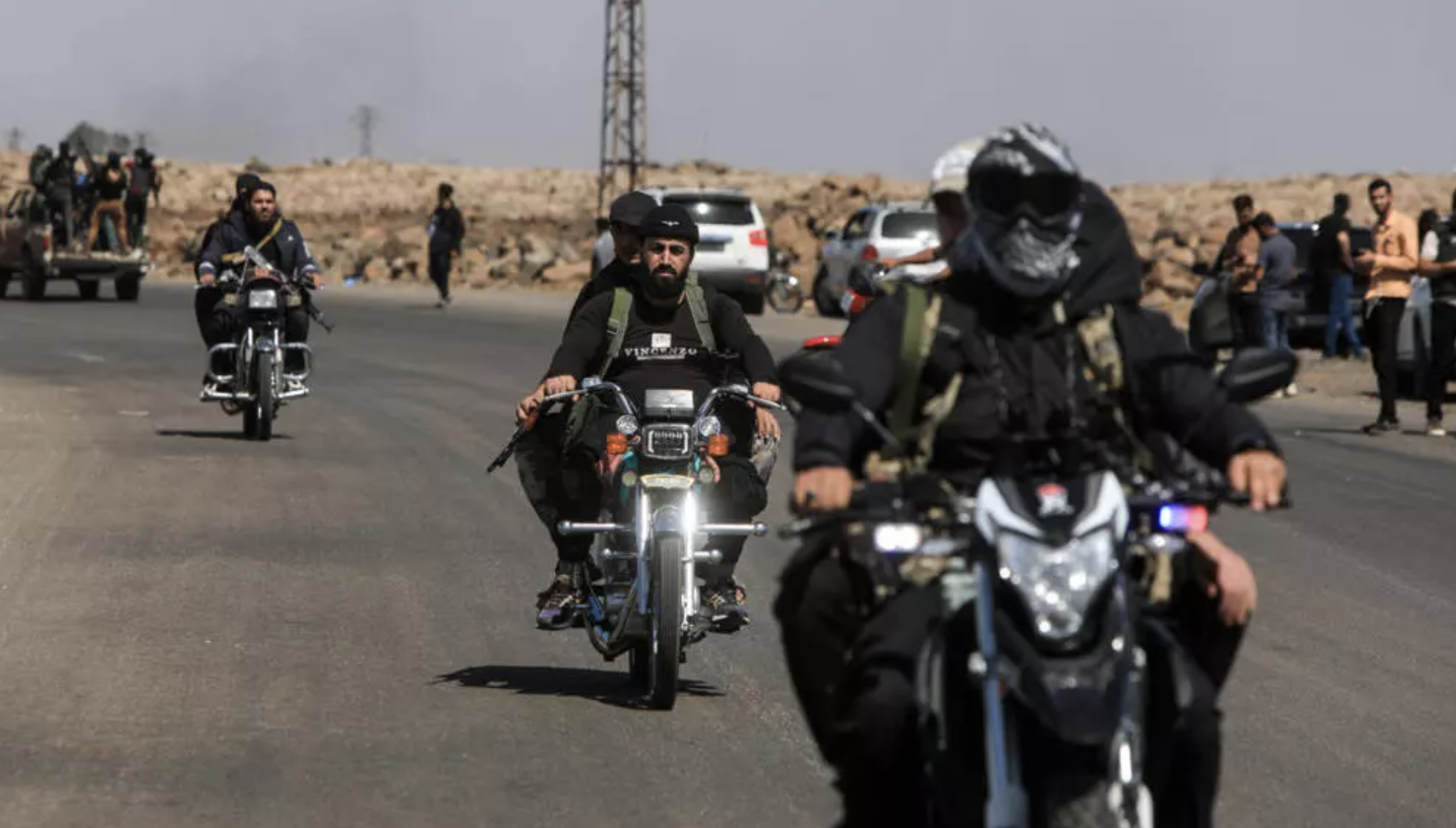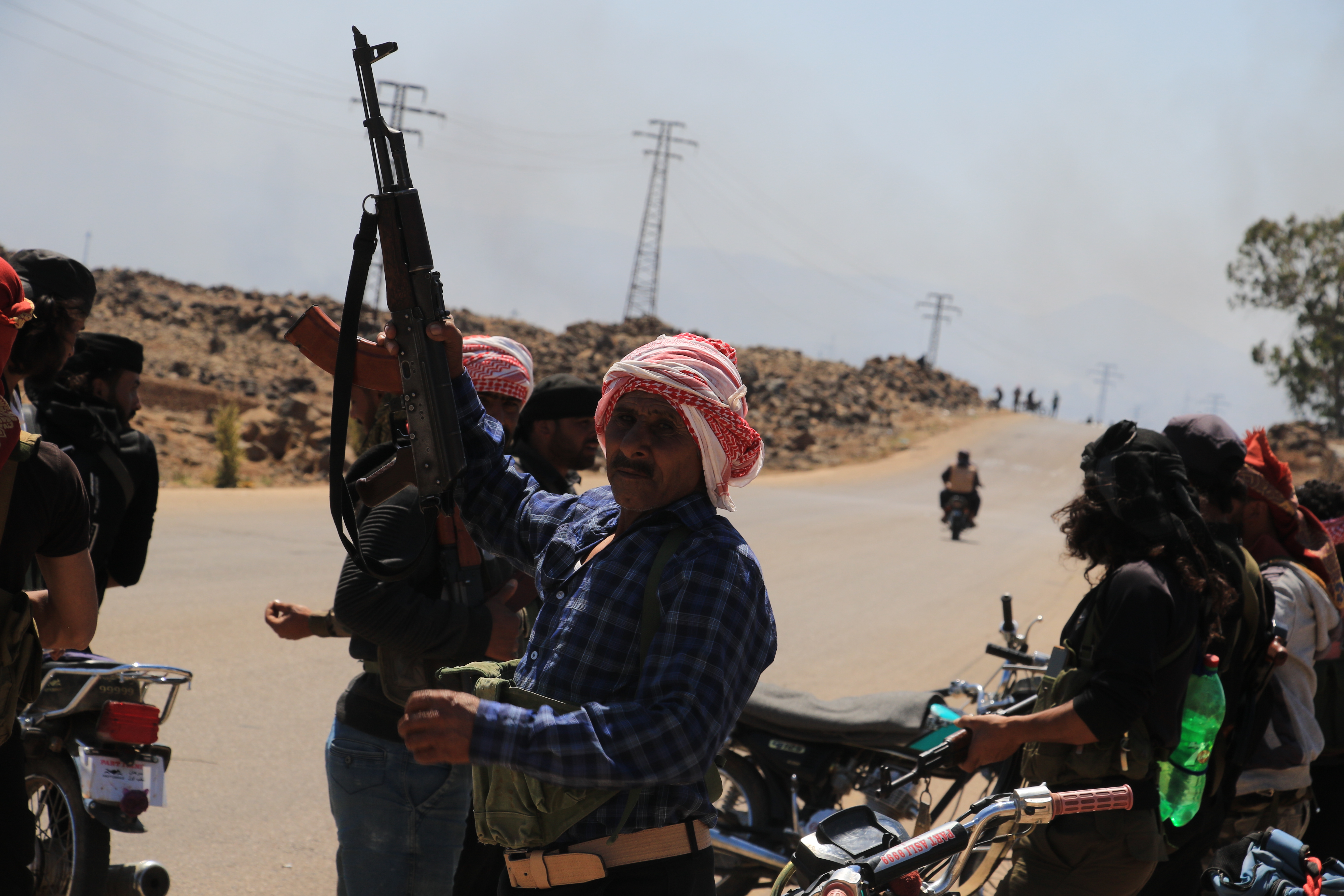Al-Hijri’s Cooperation with ‘Israel’ Ignites Outrage Among Syrian Tribes: What’s the Story?

The counter-operation carried out by the tribal forces in Sweida disrupted Israeli Occupation’s calculations.
The entry of Syrian Arab tribal forces to support the Bedouins in their confrontation with local Druze factions loyal to Sheikh Hikmat al-Hijri, the spiritual leader of the Druze community in Sweida, became a major pressure point in the military equation of southern Syria.
Scenes of killings and the displacement of Bedouin families from rural Sweida by militias loyal to Hikmat al-Hijri on July 17, 2025, prompted tens of thousands of tribal fighters from across Syria to mobilize toward the city.

Support and Solidarity
The tribal elders and leaders from across Syria declared a general mobilization in support of the Bedouin tribes in Sweida, a predominantly Druze province. On July 17, the tribes issued a statement expressing deep concern over the crimes committed by Hikmat al-Hijri’s militias against the Bedouin clans in Sweida, including killings, extermination, and the displacement of innocent families.
They emphasized their moral and tribal duty to support their Bedouin brothers and called on the government not to interfere or obstruct fighters arriving from outside the region, considering their mobilization as a legitimate defense against aggression targeting women, children, and elders. The tribes also issued a call to clans across Syria to head immediately to Sweida to prevent what they described as a massacre and ethnic cleansing.
Following these developments, tribal forces succeeded in taking control of several towns in the Sweida countryside and reached the outskirts of the city, which local Druze factions had turned into a fortified area. Meanwhile, the official Syrian security forces remained neutral observers after coming under attack from these Druze militias.
The government forces had entered Sweida on July 13 to intervene in clashes between Bedouin tribes and local Druze factions, which had resulted in dozens of deaths on both sides. However, after Hikmat al-Hijri publicly rejected a proposed agreement with Druze religious leaders to restore security and stability, Syrian forces withdrew.
Many Syrians accused al-Hijri of escalating the conflict and transforming Sweida into an international issue after he called on Israeli Prime Minister Benjamin Netanyahu to “save Sweida.” Shortly after this call, and amid Syrian army efforts to restore order, “Israel” launched a major attack on July 17, 2025, with airstrikes targeting more than 160 locations across four provinces: Sweida, neighboring Daraa, rural Damascus, and Damascus itself, including the General Staff headquarters and areas near the presidential palace.
On the same day, Netanyahu outlined “Israel’s security strategy” in a televised statement, declaring a plan to disarm the area south of Damascus—from the Golan Heights to Jabal al-Druze—and to protect the Druze population there.
Despite the ceasefire attempts, clashes between Syrian tribal forces and Druze militias loyal to al-Hijri persisted. On July 18, U.S. envoy Thomas Barrack announced an agreement for a ceasefire between Syria and “Israel,” supported by the United States, Turkiye, Jordan, and neighboring countries. Barrack called on Druze, Bedouins, and Sunnis to disarm and unite to build a new, peaceful Syrian identity.
The Syrian presidency also declared a comprehensive ceasefire in Sweida, committing to implement the agreement responsibly and stabilize the situation.
The Unitarian Druze community council in Sweida announced on July 19 that, under the auspices of unnamed guarantor states, the parties agreed to deploy security checkpoints outside the administrative borders of Sweida.
However, clashes continued in violation of the ceasefire. On the same day, tribal spokesman Mahmoud al-Jarallah stated that fighters would return home if the agreement was implemented and security restored, emphasizing the need to eliminate those seeking foreign intervention and affirming loyalty to Syrian unity and leadership.
Many Syrians see Hikmat al-Hijri as having ignited sectarian strife and accuse him of betrayal, particularly after his call for Israeli Occupation involvement.

‘Stopping the Israeli Project’
Mudar Hamad al-Asaad, head of the Supreme Council of Syrian Tribes, said their mobilization toward Sweida was what halted the Israeli project in Syria.
“The Syrian tribes overturned the military calculations in southern Syria over recent days, demonstrating that when united, they become a formidable military, political, and social force within the local balance of power,” al-Asaad told Al-Estiklal.
Al-Asaad emphasized that the tribal mobilization was not aimed at fighting the Druze but at resolving the conflict and sending a message to all the mountain’s inhabitants about their role in quelling sedition—especially in light of a third party’s presence on the ground, which has sought to sow discord among Syria’s people, represented by Hikmat al-Hijri’s dominance over the Druze majority’s decisions.
“The tribes and clans in Syria must play a role in preserving civil peace, protecting the Syrian state, and resolving disputes,” he added.
“The strength of the tribes lies in their ability to thwart all plans intended to divide or dismantle Syria.”
Al-Asaad said since joining the Free Syrian Army to oppose Bashar al-Assad’s regime and its militias after the revolution, the Syrian tribes have been a decisive force in confrontations.
From a military perspective, it is clear that the Syrian tribal forces have complicated Israeli calculations in southern Syria.
This is echoed by retired Brigadier General Abdullah al-Asaad, head of the Syrian Strategic Studies Center “Rasd,” who said that the counter-operation carried out by the Syrian tribes against al-Hijri’s militias disrupted Israeli calculations, leading to new understandings in the region.
“The tribal forces launched a counterattack aimed at blocking the ‘David Corridor,’ an Israeli project passing through southern Syria that Netanyahu seeks to implement using the ‘cheap tool’ Hikmat al-Hijri”, he told Al-Estiklal.
The “David Corridor” concept envisions connecting “Israel” to Iraq as part of the Zionist dream of the “Promised Land.” According to their religious texts, the “Promised Land” refers to the territory God promised to the prophet Yaqub, stretching from the Nile River in Egypt to the Euphrates River in Iraq.
Following the fall of the Assad regime on December 8, 2024, discussions in “Israel” began about implementing the “David Corridor” project with the help of the Syrian Democratic Forces (SDF). This land corridor, extending from the Golan Heights to northern Syria, aims to reshape the political and geographical landscape of the region.
On July 17, 2025, al-Hijri called for opening corridors from Sweida province toward areas controlled by the SDF in northeastern Syria, as well as toward neighboring Jordan.
This came after al-Hijri rejected the new Syrian state’s efforts to extend control over security and government institutions in Sweida, particularly following the advance of Syrian security forces into the province on July 13, 2025, to restore stability after clashes between Bedouin tribes and local Druze factions in its countryside.

‘Monitoring the Movements’
Israeli Foreign Minister Gideon Sa’ar criticized the speech of the Syrian president, Ahmed al-Sharaa, following the announcement of a ceasefire agreement in Sweida and his praise for the Arab tribes.
On July 19, 2025, al-Sharaa stated that with the state’s withdrawal from some areas, armed groups in Sweida began launching violent retaliatory attacks against the Bedouin and their families, leading to mass displacement and a climate of fear and chaos.
These retaliatory attacks, coupled with human rights violations, prompted other Arab tribes to rush to break the siege on the Bedouin inside Sweida, escalating tensions and causing significant changes in Syria’s security landscape, according to al-Sharaa.
The Arab tribes in Syria have long been symbols of noble values and principles that compel them to mobilize and support the oppressed. Throughout history, they have shown honorable stances by standing with the Syrian state and offering support and sacrifice in facing the country’s challenges.
He also noted that the tribes have often served as a bulwark against internal and external threats and have played an active role in preserving the country’s unity and stability.
In response, on July 19, 2025, Sa’ar accused al-Sharaa’s speech of expressing support for attacking jihadists, blaming him for the deaths among the attacked Druze minority.
These developments in Sweida have provided the Israeli Occupation with a pretext to intervene under the guise of protecting the Druze community.
Since the fall of Bashar al-Assad’s regime, Israeli Occupation forces have targeted Syrian heavy weapons sites as part of a declared plan to “demilitarize southern Syria and remove threats.”
Following recent events in Sweida, Netanyahu reaffirmed “Israel’s commitment” to what he called “defending the Druze population in Syria,” stressing that “Israel’s interest” lies in maintaining a weapons-free zone in southwestern Syria.
The mobilization of more than 50,000 lightly armed Syrian tribal fighters aiming to ultimately enable the Syrian state to regain control of Sweida does not alarm “Israel.”
This is reflected in the comments of Wael Alwan, a researcher at the Jusoor Center for Studies, who told Al-Estiklal that “the tribes’ reaction likely does not concern Israel unless there are more organized movements in southern Syria or near the borders.”
“Israel has no intention of defending the military council in Sweida loyal to Hikmat al-Hijri; rather, it wants stability in the surrounding countries and is exploiting the situation in this province to safeguard its national security,” he said.
“Israel’s harsh reaction to Syria was due to the Syrian army’s entry into Sweida with heavy weapons on July 13, 2025, to break the clashes between Bedouin tribes and Druze factions.”
“Given the rapid developments in Sweida, Israel will work with the U.S. to ensure its national security demands are met by the Syrian government, while also leveraging the situation in the province for negotiating gains with Damascus,” Alwan added.
Sources
- Thomas Barrack Announces Ceasefire Agreement Between Syria and Israel [Arabic]
- Syrian Presidency Announces Full Ceasefire and Calls for Immediate Compliance [Arabic]
- Tribal Clashes Erupt in Sweida as Interior Ministry Denies Deployment of Its Forces [Arabic]
- Al-Hijri Incites Against Syrian Government, Urges Trump and Netanyahu to Intervene [Arabic]
- 50,000 Arab Tribal Fighters in Syria Advance Toward the City of Sweida [Arabic]











